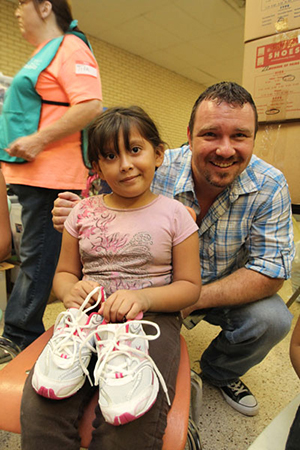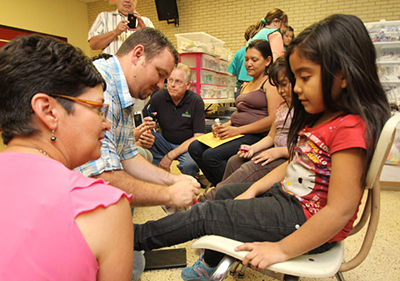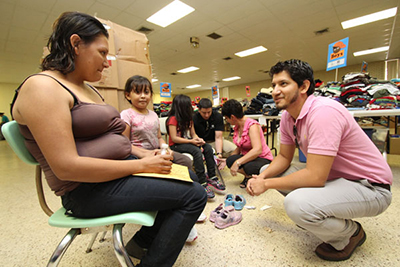By Russ Dilday
By the time the young mother and her two daughters arrived in McAllen, Texas, they were bone-tired.
After a harrowing month on the road from their home in El Salvador, they crossed the Rio Grande River. Then Border Patrol agents picked them up and processed them as undocumented immigrants.
The mother looked forward to a shower — her first in a month — along with a change of clothing and some food provided by the Catholic Charities Refugee Center at Sacred Heart Catholic Church.
 She also gladly received shoes for her daughters, collected through Buckner International’s Shoes for Orphan Souls program and made available to the waves of children who pass through the center daily with their parents.
She also gladly received shoes for her daughters, collected through Buckner International’s Shoes for Orphan Souls program and made available to the waves of children who pass through the center daily with their parents.
The mother made the journey with her daughters, ages 6 and 8. Their decision to leave El Salvador wasn’t easy, nor was it inexpensive, but she said it had to be made.
“First, it wasn’t safe for my children, and then there was no employment,” she said. “There is nothing you can do in El Salvador now for employment, and I can’t even be sure my kids will be safe because of Mara Salvatrucha,” a prominent Salvadoran drug gang, also known as MS-13.
“One of my nieces was being harassed by the gangs, and I didn’t want to have my daughters endure the same treatment,” she explained.
So, she and her husband made the decision for her and the girls to travel the dangerous route to the United States to join family in New York.
They paid smugglers — known as coyotes — $3,500 to lead them past her country’s border, through Guatemala and Mexico and finally to the U.S. border, where they swam across the Rio Grande.
The family “travelled by bus mainly at night, and stayed in warehouses, sleeping on the floor for three to five days at a time while we waited to go from one country to another.” Along the way, one daughter became ill, but the family did not have access to medical attention.
The coyotes on the Salvadoran side, she said, were “somewhat kind, but after that … those guys were not nice people.”
The family received an Aug. 4 court date for an immigration hearing in New York. The mother plans to attend. She also will wait for her husband, who is planning to make the journey soon.
Their story echoes the experience of many families who have crossed the border as part of a surge in recent months, said Javier Perez, manager of missions and humanitarian aid for Buckner International in the Rio Grande Valley.
“The people are coming from Mexico, Honduras, Guatemala and other Central American countries,” he said. “Many of them have paid thousands of dollars to coyotes to have them guided here. Most haven’t had baths in a while. So they throw their clothes away when they come to the refugee center here. The children’s shoes are hanging off of their feet because they have walked so much. That’s why the shoes are so important.”
 Buckner shipped 8,000 pairs of shoes to the Valley in mid-July to help in the relief effort. Matt Asato, Buckner senior director of ministry engagement, said the ministry hopes “that shoes provide the hope and love of Jesus to them. By meeting their physical needs, we hope they will feel that love, despite any political situation, that they will know that people will serve them for who they are — children of God.”
Buckner shipped 8,000 pairs of shoes to the Valley in mid-July to help in the relief effort. Matt Asato, Buckner senior director of ministry engagement, said the ministry hopes “that shoes provide the hope and love of Jesus to them. By meeting their physical needs, we hope they will feel that love, despite any political situation, that they will know that people will serve them for who they are — children of God.”
Among partners Buckner is working with during the effort is Texas Baptists’ Disaster Recovery, an initiative of the Baptist General Convention of Texas. Chris Liebrum, director of disaster recovery, said the shoes fit into a larger plan that will involve both donations and volunteers.
“All of these families need new shoes, and our goal is to involve churches in responding to these situations,” Liebrum said. “They can give things like shoes through organizations like Buckner like they’ve done,” Liebrum said, adding there will be a need for volunteers soon. “All indications we’re getting is that there is going to be the need for ongoing work in this area.”
He also noted all Christian groups face a similar challenge as the government ramps up its response to the crises of immigrant families and unaccompanied children.
“One of the challenges of working with the federal government, as well as state and local [governments], is their timing, rules and policies, but there will be plenty of opportunities for Texas Baptists to get involved in the future,” he said.
The two children from El Salvador who arrived with their mother each were fitted with a new pair of sneakers. Taking advantage of a lull in the line, volunteer Chad Mason, pastor of mobilization and global impact for Calvary Baptist Church in McAllen, let the 8-year-old pick out a favorite pair before placing them on her feet.
“Calvary has been working with the refugee center since the third day it went into operation here,” he said. “We’ve been providing volunteers, about 10 per day at the center and an additional 10 doing laundry.”
The family from El Salvador is characteristic of the people served at the center, Mason said.
 “These families are typically one mother and two or three small children. The families take an average of 10 to 12 days on their journey here, plus three to four days in processing by Border Patrol. So by the time they get here, they haven’t had a shower or time to themselves or any rest. We’ve had stories [of trips] that went up to 40 days,” he said.
“These families are typically one mother and two or three small children. The families take an average of 10 to 12 days on their journey here, plus three to four days in processing by Border Patrol. So by the time they get here, they haven’t had a shower or time to themselves or any rest. We’ve had stories [of trips] that went up to 40 days,” he said.
The center and its volunteers “first try to give them dignity. So a shower does a lot for someone, plus two or three changes of clothes they can take with them on the bus,” he said. “These kids getting shoes mean everything. This will be a huge blessing for them.”
Nancy Wagner, a Catholic Charities volunteer from the Diocese of Camden, N.J., echoed that message.
“It [shoes] is a desperately needed commodity for them,” she said. “Many of them come in with their feet hurting. They’ve been walking, their shoes are muddy, they’re torn and their shoelaces have been taken away by whatever government entity was holding them. This is a really big blessing to have these shoes to give them.”
Like many of the volunteers who have given aid to the families at the center, Wagner said she prays “that they find hope and a new way of safety for their families and they make a living here and have a normal life, not having to live in fear and extreme poverty.”
In addition to working with agencies along the border, Buckner officials also are pursuing other ways to help the government deal with the surge of immigrants. Officials at Buckner are in daily contact with government leaders, monitoring developments. Those contacts include officials in Dallas County, which has offered to take as many as 2,000 children for long-term care.
But Randy Daniels, who is coordinating Buckner’s efforts, cautioned the process is slow and at this point, Buckner is waiting on decisions from the U.S. government.
